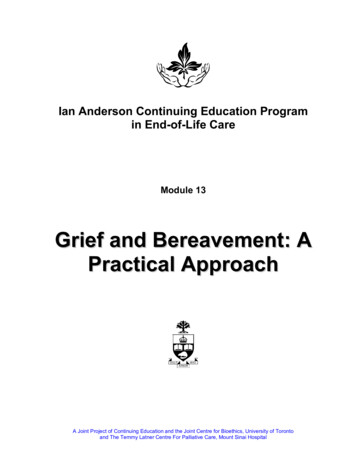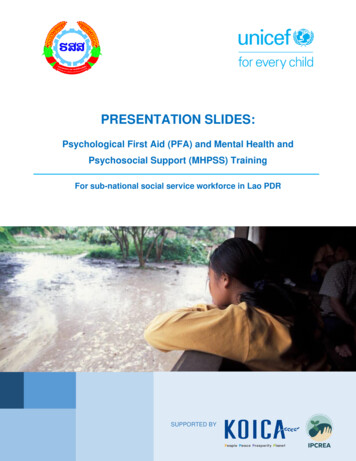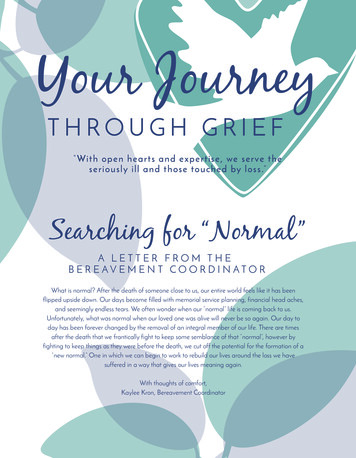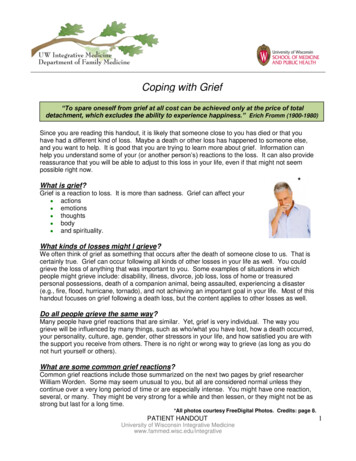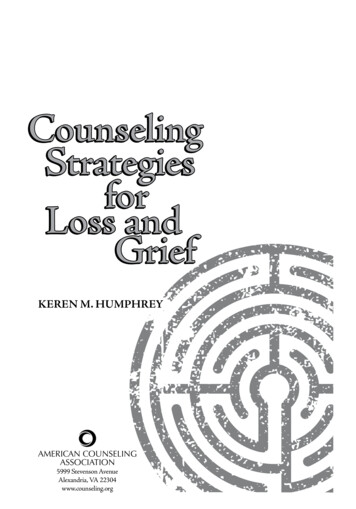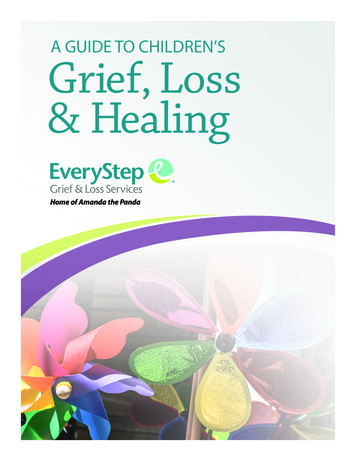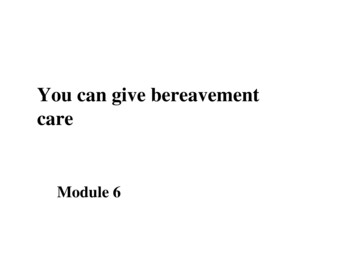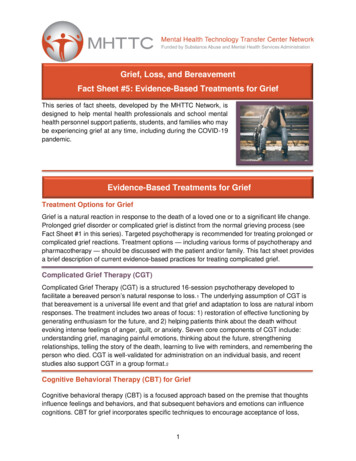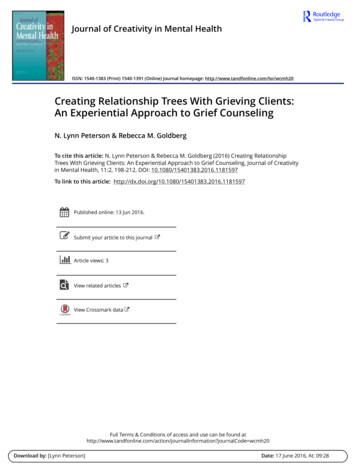
Transcription
How to Work Through GriefWHAT IS GRIEF?Grief is the reaction to a loss. This does not only refer to the loss of a loved one, but can also include theloss of opportunities, goals, relationships or previous routines.Mourning is the outward expression of grief: talking about the deceased, celebrating their life, crying orhugging relatives.Grief is a process, not an event and will take time to work through. It can affect all aspects of your life:emotionally (feelings, thoughts, perceptions), socially (relationships with others) and physically (changesto your body, aches and pains). You may find yourself searching for new meanings or questioning yourbeliefs and values.The purpose of grieving is to:oooAccept the reality of the loss.Work through your feelings and thoughts in order to incorporate the loss into your life.Adapt to the changes and allow yourself to move forward with life.There is no such thing as “normal” grief, it is personal and influenced by many factors:oooNature of the relationship with the deceased.Cause of death and the situation (expected, unexpected).Characteristics of the bereaved individual: personality, religion, age, gender, support available.Literature is available that provides explanations of the different “stages” of grief and the feelings that abereaved person “should” experience. Although these might serve as guidelines and can include somecharacteristics of grief, the process is not predictable. There is no definite order of events that mustoccur.You will survive your grief, despite how hard and painful it might be. Remember that recovering from aloss and moving on with life should not be a source of guilt; it does not mean you do not love or miss thedeceased.December 2020For more information, contactpalliative.care@ahs.ca
How to Work Through Grief 2WHAT CAN I EXPECT WHEN GRIEVING?Healing from a loss does not occur overnightIt takes time and patience to confront and overcome your emotions, as well as return to daily activitiesand a functional routine. Grieving is work: it takes a toll on both physical and emotional energy and canleave you feeling exhausted.Everyone experiences grief differently and must work through their grief as individualsAvoid comparing your grief pattern and reactions to others. You do not need to grieve according tosomeone else’s timetable, instead make this experience your own. Some people will be open withexpressing their feelings; others will become more reclusive and may not feel anything at all.Move at your own paceDo whatever makes you feel comfortable and don’t force yourself to feel something that you are not.People may comment that you should be “back to normal soon” or “it’s been a few months, you shouldbe better by now”. Try not to let this pressure you to change the way you are grieving. Reassureyourself and inform others that grief is different for everyone and that maybe you are moving at aslower rate than they expected.The experience of grief is full of highs and lowsThese lows may be intense and frequent at first, but over time they will become less severe and occurless often. Certain days will be harder than others as they may be strongly linked to memories of thedeceased or the circumstances of the death: holidays, anniversaries, family get-togethers, photos orplaces.Expect that you may be overwhelmed and surprised by the wave of feelings you are experiencing. Attimes you may feel that you are going crazy or are out of control. You may be confronted with thoughtsor emotions that you have never had before. As well, emotions can be conflicting. For example youmay be sad and longing for the loved one to come back, while at the same time angry at them forabandoning you.
How to Work Through Grief 3Your relationships with others may changeThis can include your relations with your spouse, children, friends, or colleagues at work. Some peoplewill be willing to accommodate you through your grief by offering support, comfort and by being a goodlistener. Others, will be unable to understand what you are experiencing and may not be willing totolerate your grief. It may be helpful to inform others of how you are feeling and your needs for copingwith the loss. At times, you may have to learn to be patient with those who interpret your griefdifferently.Grief may not be immediateIt may take days or weeks for the reality of the loss to set in. Grief emotions may be felt in response toanother event that somehow triggered memories of the loss. As well, there may be a time when youfeel that you have recovered and that things are “going back to normal” when suddenly you are facedwith intense emotions.You may not be able to return exactly to the way you were before the deathParts of the grief may stay with you forever. Confronting the loss, however, will allow you toincorporate the death into your life and move on with new experiences without forgetting about thedeceased.WHAT FEELINGS ARE “NORMAL”?“Normal” is not a good word to use in describing emotions because in reality there are a broad range ofemotions and reactions that can be experienced when grieving a loss. What is important is that you giveyourself permission to feel the way you do. Accept your feelings as being real and work on findingconstructive ways to channel them.Shock and numbness: When the death occurs you might be asking yourself “is this a joke?”, “is it reallyhappening?”, “no, this is a mistake”, “it’s just a bad dream”. Cognitively you understand the loss, butemotionally you cannot accept that the loved one is gone. You may be in a state of disbelief.Denial: You may want to avoid the pain of the loss all together by pretending it did not happen, or bycarrying on with your regular routines. For the time immediately following the death, this can beexpected. However, in order to successfully recover, it is important to accept the loss and give in toyour emotions in order to deal with them constructively.Confusion: You find yourself having difficulty concentrating and completing simple, everyday tasks. Youmight feel disorganized, forgetful and unable to make decisions. This is a common reaction – you arenot going crazy.
How to Work Through Grief 4Anger and resentment: It is natural to want to protest against the death. Anger can be exhibited notonly through rage, but also through being irritable, annoyed, agitated and frustrated. You may be madat the deceased for abandoning you, at the doctors or nurses for not curing the disease or towards yourfriends for not saying the right things. You may even be angry at yourself for not visiting the loved oneenough during the illness.Jealousy: You may experience feelings of jealousy towards friends, coworkers or family members for nothaving experienced a loss or having to work through the pain.Guilt: You may feel guilty about something you said to the deceased and regret, of not being supportiveenough, not visiting enough or in thinking that you may have caused the death. You might be runningover different scenarios in your head such as “what if ” and “if only ”.Relief: You may be thankful that your loved one is no longer suffering and that their long battle with theillness is over. Being an active caregiver of the deceased during their illness is a time consuming andstressful job; you might be relieved that this is over. This is a feeling bereaved individuals may not admitto, but is natural nonetheless and should not be a source of guilt.Anxious: You may feel as if you are in a state of panic or fear. This can be caused from having a lack ofcontrol over the situation or feeling insecure and vulnerable. You may worry about how you will be ableto go on with life without the deceased or that other loved ones may die.Sadness: You may feel hurt and pained that someone you love has been taken away from you. You mayhave a sense of longing for the deceased to come back so that life can return to the way it once was.o If it has been more than 6 months and you still cannot get out of bed or feel unable to carry outdaily activities (work, grocery shopping, cooking, cleaning, driving) than you may need to consulta therapist or doctor.Loneliness: The feeling of being abandoned or empty inside because the person is gone. You may feelthat no one understands you, or you cannot relate to others. This may create a sense of isolation.Withdrawal: For a time you may have less interest in interacting with others, or participating in activitiesyou once used to like. You may withdraw socially, become less communicative, and more private. Thiscan be an important time for inward reflection, but is usually only temporary.
How to Work Through Grief 5WHAT PHYSICAL SYMPTOMS MAY BE EXPERIENCED? Changes in eating pattern Weight gain or weight lossHave less energy Tightness of the throat or in chestUncontrollable crying Dizziness, headachesFeeling empty and heavy RestlessFeel weak Tremble, chillsUpset stomach or nausea IrritableDifficulty sleeping or getting up in the morningHOW LONG WILL GRIEF LAST?There is no definite time limit on grief because the experience is individual: everyone reacts to lossdifferently. Avoid giving in to the belief that you will just “get over” the grief but instead find a way ofcoping with it. In fact, some aspects of the loss will stay with you forever.After 2-4 months, many individuals are able to start carrying out daily activities or routines. Severeemotions and stress are often lessened or do not feel that they are weighing you down.This does not mean you will not still be hurting or that you have forgotten about the deceased. You mayfeel that you are betraying your loved one by adapting to life without them. Remember that it is okay togo back to previous activities and allow yourself to be happy again; this is an important step towardsrecovery.For many bereaved individuals, it takes at least a year or two to move through the grief process andadapt to a new way of life without their loved one.Be aware that you may encounter a situation, memory or feeling that triggers the grief surrounding aloss, even when you think you may be fully recovered. This can occur many months or years later. Forexample, the recent death of a friend might bring up the pain of a grandparent’s death, or turning theage at which parent or sibling died might be a source of distress.WHAT CAN I DO TO HELP MYSELF COPE WITH A LOSS?Recognize the reality of the lossThis includes questioning what happened, protesting the death and replaying the event in your mind.Once the death is acknowledged and you are no longer in shock, you can focus on your emotions ofgrief; this can be difficult and painful but is important in healing.
How to Work Through Grief 6Accept the emotions we are feeling, and face themThe topic of death is avoided in our society, and often openly expressing emotions is considered a signof weakness. Denying your emotions because you think they are wrong might contribute to moredistress and force you to act as if everything is okay when it is not. There is nothing wrong with grieving;it is a normal and important part of healing. Don’t be embarrassed if you cry all of a sudden, need to dophysical activity as an outlet, or want to talk out loud to the deceased.Talk to someone you trust and feel comfortable sharing your feelings and thoughts withThis may be a friend, counselor, family doctor, nurse or spiritual/religious leader. It is important that theperson is a good listener, and will be supportive of you. Try not to choose someone grieving the loss ofthe same person. Even though your family is a source of love and support they might be deeply grievingas well.Some find it hard to openly express their thoughts or are uncomfortable sharing with others; it might behelpful to write down what you are feeling in a diary or letter to the deceased.Avoid judging yourselfTry not to evaluate how you are feeling based on other people’s experiences of grief. Often settingdeadlines or outlining stages of how you should deal with your grief is detrimental and discouraging.Focus on what you are experiencing and your own needs. If you aren’t crying or acting sad and do notfeel the need to share with others this does not mean you are not mourning the death.Take breaksGrief can be difficult and overwhelming and you cannot expect yourself to be grieving at all times. Allowyourself to take in the reality and the emotions of the loss bit by bit rather than all at once. Take timeaway from your grief by doing something else such as exercising, shopping, and going to a movie orreading a book. This is an excellent time to rejuvenate and keep your energy up.It is okay to talk about the deceased if you feel comfortableFriends and family might avoid talking about the deceased around you in fear that you might becomeupset or offended. It is important to inform others when you feel you are ready to talk about your lovedone. Reassure them that you might become upset or show emotion but that this is part of yourexperience.Participate in activities and hobbies that you enjoy or find relaxingThis can include: sports (biking, rollerblading, and soccer), reading, listening to music, gardening orcrafts. These may help in getting you back to a pattern or routine. Try not to make yourself feel bad forlaughing or having a good time. This is a healthy part of recovering and is not disrespectful to your lovedone.Accept help from othersDon’t be afraid to accept or ask for help from friends and family, even if it is just to help clean the house,or cook a meal. You will need outside support to get through this difficult time.
How to Work Through Grief 7Physical healthTry to maintain a balanced lifestyle: eat healthy foods, drink lots of water and avoid alcohol andcaffeine. This will help you in recovering from some of the physical symptoms of grief and provideenergy to get through your day. Exercising can also help with sleeping; try to get out for a walk or do anactivity with friends/family.RestGive yourself time to rest, especially if you are having trouble sleeping. Read a book, watch a movie orlisten to favorite music. You may not be able to sleep, but taking a moment to relax and take your mindoff your grief is just as important.Remove extra sources of stress in your lifeFree up your schedule, allowing yourself to say “no” to certain obligations, and postpone making majordecisions or changes. Sometimes making “to-do” lists can be helpful.Attend support groupsInteract, share and learn from others who are grieving a loss. You may be surprised to find that aspectsof their experiences are similar to yours. Support groups have helped many people in confronting theiremotions and recovering from a significant loss. They provide a supportive environment where manyindividuals feel comfortable sharing.For more information about available support groups contact a local hospice, hospital, or counselingclinic. .REFERENCES:Terese A. Rando - How To Go On Living When Someone You Love Dies.Lynne Ann DeSpelder & Albert Lee Strickland - The Last Dance: Encountering Death and Dying. 7th ed., Chapter 8.Kenneth J Doka - “A Primer on Loss and Grief.” Living with Grief: At Work, At School, At Worship.Sally S. Roach & Beatriz C. Nieto - Healing and the Grief Process.Alan Wolfelt - Afterwords: Helping Yourself Heal (booklet)“Grieving.” Home Care Guide for Advanced Cancer. American College of Physicians. 1997. American College of Physycians websitewww.acponline.org/public/h care/10-griev.htmBOOKLETS:“Grief and relationships”, “The journey of grief”. Children’s Hospitals and Clinics of Minnesota, Healing Quilt.Project Funding Provided By:T HE ORDER OF SAINT L AZARUSGRAND P RIORY IN CANADA
control over the situation or feeling insecure and vulnerable. You may worry about how you will be able to go on with life without the deceased or that other loved ones may die. Sadness: You may feel hurt and pained that someone you love has been taken away from you. You may
